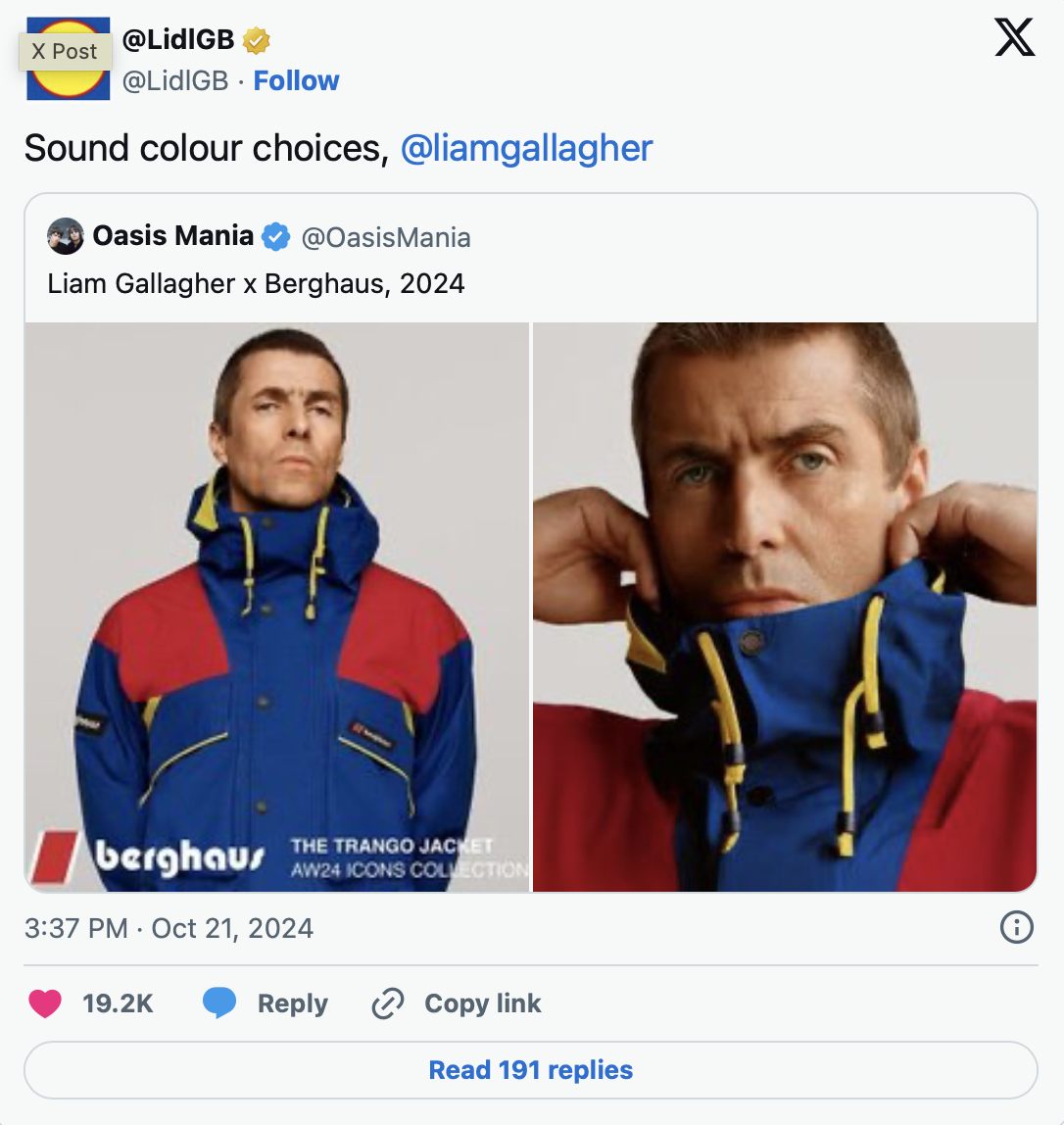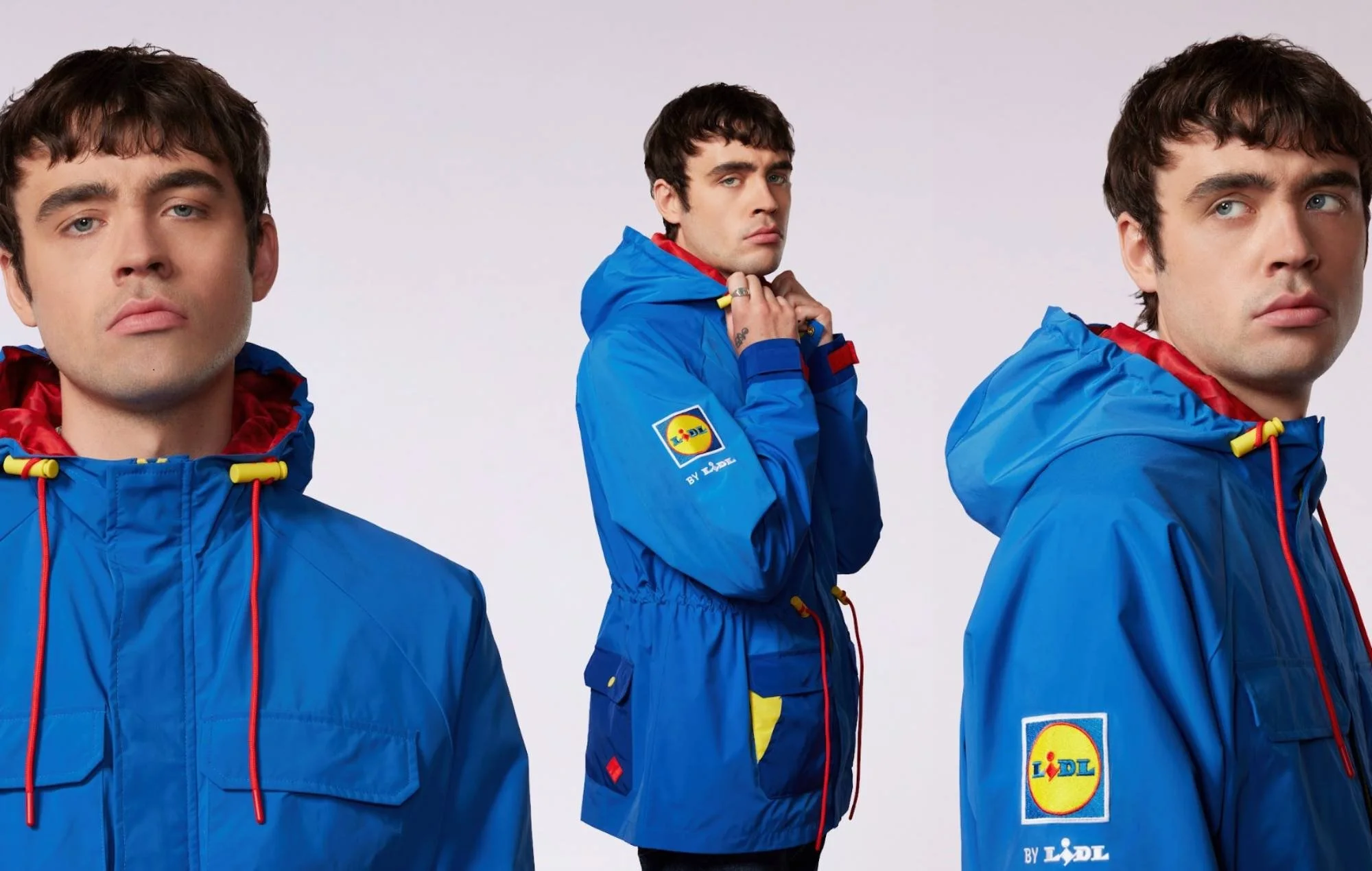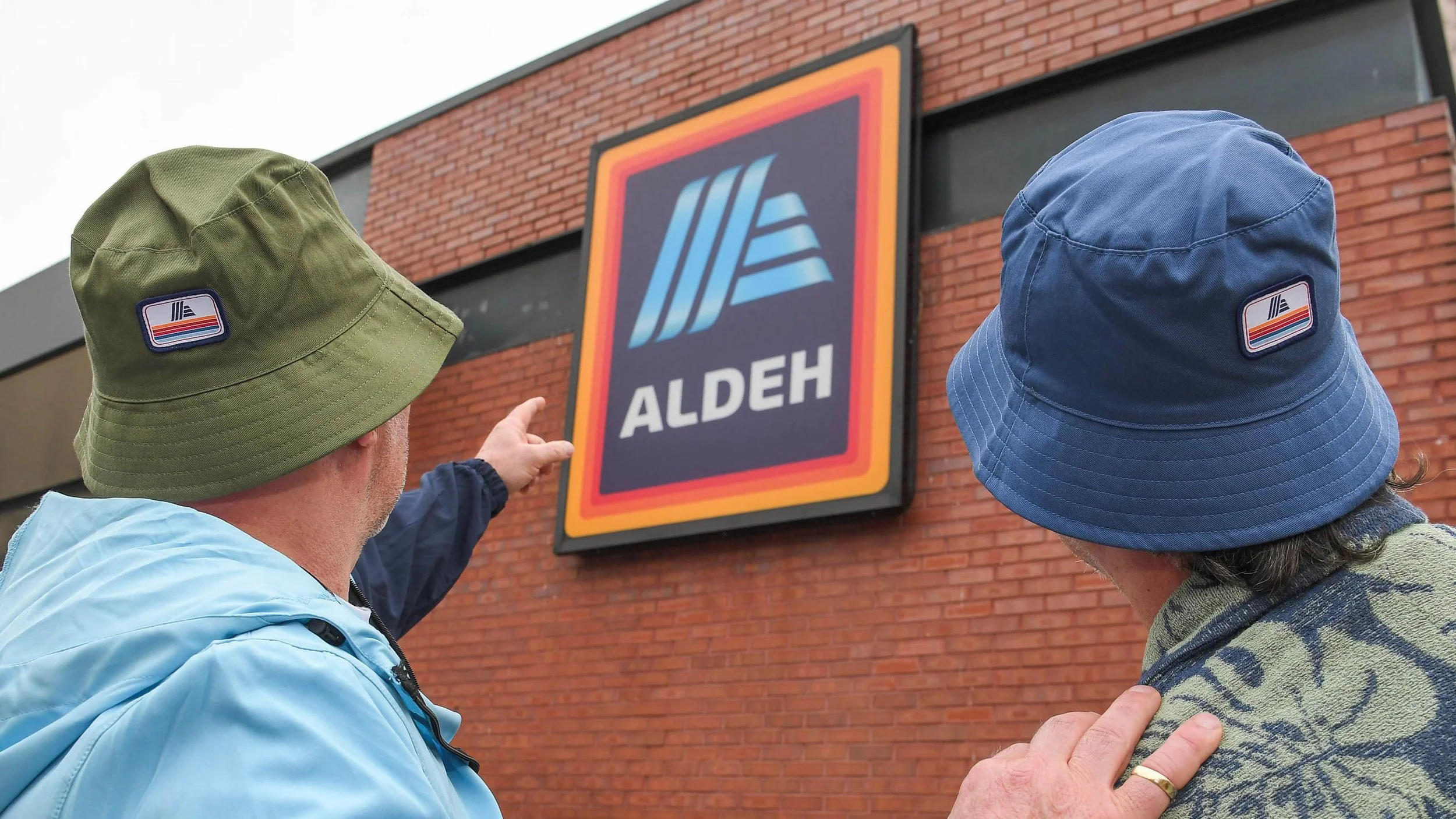Lidl and Oasis are brand match made in heaven
What supermarkets have in common with Britpop?
The Great Wait is Over, after Oasis announced their long-awaited reunion following 16 years of silence, interrupted by the occasional exchange of insults and provocations between the Gallagher brothers. A massive UK & European fandom has gone mad, ready to slip back into their 90’s youthful era.
Many fans expressed their connection to the band and cultural resonance with the Britpop era through their clothing and concert merch. The obvious winner is Adidas, as the official branded merch provider, with their Adidas x Oasis collection of nineties design aesthetic, reminiscent of the pieces the Gallagher brothers wore in their heyday. But unexpectedly, another winner who managed to transfer a portion of Oasis brand equity to themselves is the German food retailer brand Lidl. While Adidas has been know as a street & pop culture steward for almost 80 years, supermarkets and Britpop music have in common one profoundly fundamental element — common people.
Britpop stared in the early 1990s in the UK among the working- to lower-middle-class. It was partly a response to the both economically and socially austere rule of Margaret Thatcher in the 1980s, marked by heavy economic restructuring, high unemployment, and strong class divides. Music-wise, it was a reaction against great popularity of American grunge bands like Nirvana and Pearl Jam, who embraced darker, angst-driven style. Britpop wanted something more upbeat, optimistic and relatable. With the political arrival of New Labour policy by Labour Party, and their famous national rebranding campaign “Cool Britannia” came the general mood shift towards national optimism, prosperity, and expression of a new modern British identity. The Britpop bands rode on that cultural and economic wave, while also being part of it.
Britpop bands members, Oasis, Blur, and Pulp among others, had middle and lower-middle working-class backgrounds, growing up in single-parent households, living in a council estates or suburban areas, and feeling class tensions on their own skin. The music offered them escapism, and their backgrounds influenced their songwriting, depicting ordinary urban life, pleasures in a working-class world, aspirational lyrics dreaming of something bigger, and ironic social commentary.
Pulp’s widely popular hit Common People, which swept the British music charts in 1995, is a critique of “class tourism.” The song’s narrative is about wealthy girl wanting to experience the “exotic” life of common, working-class people. In 2014 the song was declared the anthem of Britpop as it captured the essence of the time perfectly, summing up a feeling of “us and them.” A wealthy girl flirted with a working-class boy, who took her on a date in a supermarket as one of the pit stops of common people. He asked her to pretend to have no money, as nobody there had any at the time, which she found funny, completely missing the point.
This cultural context explains why the Lidl-Oasis connection worked so naturally. The Oasis-mania really belongs to the supermarkets. While Oasis members climbed the social ladder far above the working class, and Britpop became capitalised as the one of the most valuable British brands, the shaking global economy and turmoil of the post-Brexit Britain, lowered the financial capabilities of many 90s Oasis fans. The band’s new, younger fans like Gen-Z are facing generational economic challenges in living a balanced life and achieving milestones normal for previous generations, like buying real estate.
More and more people find the grocery shopping a disturbing experience, watching in disbelief the amount of the items they bring back home in a huge disproportion to the new status of their bank balance. Ironically, even a British multimillionaire Jeremy Clarkson, in the first episode of his Clarkson’s farm show, when asked if he would take a receipt after buying groceries at the local farm shop, responded: “Yes, because otherwise no one would believe me.” So affordable groceries have became a thing in the past few years, and this is where Lidl became relatable.
What made it a star of the Oasis tour mania is a photograph of Liam Gallagher wearing his trademark Berghaus parka in colours resembling Lidl’s colour palette. A brief and timely response came from Lidl, releasing a Liam-like parka ahead of the Oasis tour. Named “Lidl by Lidl”, a clever reference to the Oasis song “Little by Little”, the parka was the affordable merch for Oasis’ budget-shy fandom. A limited edition of the parka was sold out in seconds, at the reasonable price of £30. In comparison, an official and still available Adidas x Oasis t-shirt costs £45.
The parka came with all essential Gallagher features — waterproof material perfect for festivals in British weather, two insulated pockets to keep beer cans cold, an attached beer opener, and a little iconic Liam tambourine. Customers were allowed to buy only one parka per person, and all profit was donated to a UK children’s charity. Lidl signed the parka product description as: “Because Lidl by Lidl, we’ll give you everything you ever dreamed of”, another reference to Oasis lyrics. The jacket was strategically promoted with a 9 m tall mural at the (wonder)wall next to Manchester’s Etihad stadium, where Oasis were about to held a concert. Apart from the parka, Lidl sold the branded bucket hats, another style worn by Liam.
Aldi, another discount supermarket brand, jumped on this bandwagon in the most authentic and unexpected way, affirming the Oasis–supermarket connection. They decided to rename their Manchester store to “Aldeh”, which is the Mancunian pronunciation of the brand’s name. It was a temporary marketing stunt ahead of the concert in the Gallaghers’ hometown, but the reactions from the local community were so positive that management decided to keep the name permanently, honouring the local dialect and musical legacy.
What Lidl (and Aldi) got from this, finally authentic, marketing move was that it managed to transfer a portion of Oasis’ coolness to their brand attribute portfolio and secure itself a massive online and offline brand visibility. Two fans attending the Edinburgh concert were holding Lidl bags in the air while the matching song was playing. The cameraman, who passed the vibe-check, spotted the fans, and bags were shown on the huge stage screen at the concert visited by 70,000 people. Just one Instagram video capturing the moment got at least one million views, a reach of only one post on Instagram. The jackets are now being resold on the secondary market for £150.
Numerous memes and social media comments on Lidl x Oasis brand match, secured cultural alignment for Lidl without betraying their brand values or abandoning their core positioning. Their participation in Oasis mania was organic, without forced celebrity partnerships.
Though Lidl is today visited by both price-sensitive and wealthier but price-conscious consumers, it is still positioned as a food reseller providing high-quality groceries at really low prices. What Lidl managed to prove is the same thing Britpop did 30 years ago: make the most of what you can afford. No matter how financially insecure you are, no matter how gloomy economic future and social circumstances seem, the optimism, big dreams and little/Lidl things in life Live forever.







